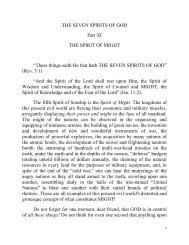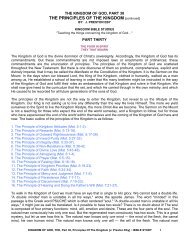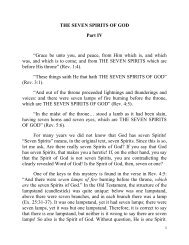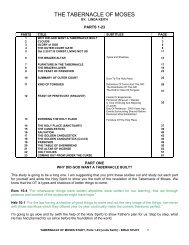Song of the Bride, Parts 1-34 - Feasting at the King's Table
Song of the Bride, Parts 1-34 - Feasting at the King's Table
Song of the Bride, Parts 1-34 - Feasting at the King's Table
You also want an ePaper? Increase the reach of your titles
YUMPU automatically turns print PDFs into web optimized ePapers that Google loves.
"Those th<strong>at</strong> are faithful unto de<strong>at</strong>h shall have a crown <strong>of</strong> life." "Hold fast th<strong>at</strong> which thou hast, th<strong>at</strong> no one take<br />
thy crown."<br />
Again, Sharon Houck has blessed us with some insight <strong>the</strong> Lord has given her. "Fa<strong>the</strong>r began calling me his<br />
<strong>Bride</strong> in 1995. I didn’t think I deserved to be called His <strong>Bride</strong>. Prior to a Festival <strong>of</strong> Worship which was to begin<br />
with a Bridal March, <strong>the</strong> Holy Spirit began to drop scripture into my Spirit. First, II Tim. Chap. 3; <strong>the</strong>n He took<br />
me back to verses 2-5. He said <strong>the</strong>se are those who are trying to put on a wedding dress but <strong>the</strong>y have on dirty<br />
underwear! He said th<strong>at</strong> <strong>the</strong> stench was reaching his nostrils! Fa<strong>the</strong>r began to show me th<strong>at</strong> <strong>the</strong><br />
undergarments <strong>of</strong> <strong>the</strong> <strong>Bride</strong> are <strong>the</strong> fruits <strong>of</strong> <strong>the</strong> Spirit. "<br />
PART THREE<br />
Newsletter No. 176 – August 2001<br />
CHRIST’S TABLE AND PRECIOUSNESS<br />
CHRIST’S TABLE AND PRECIOUSNESS<br />
MUTUAL LOVE: THE ETERNAL HABITATION<br />
PREIMINENCE OF CHRIST AND HIS BRIDE<br />
<strong>Song</strong> <strong>of</strong> Sol. 1:12 "While <strong>the</strong> king s<strong>at</strong> <strong>at</strong> His table, my spikenard sent forth its fragrance."<br />
He invites us to come and sit <strong>at</strong> His table. He does not <strong>of</strong>fer to sit <strong>at</strong> ours. The first taste th<strong>at</strong> we have <strong>of</strong> <strong>the</strong><br />
Lord’s table is when we have communion with Him through <strong>the</strong> emblems <strong>of</strong> bread and wine, which represent<br />
His de<strong>at</strong>h and resurrection.<br />
The next taste is when we enter into our secret closet and commune with <strong>the</strong> Lord. There, we taste <strong>the</strong><br />
heavenly manna and drink <strong>of</strong> <strong>the</strong> living w<strong>at</strong>ers flowing within us. We are not waiting for Him to come down from<br />
heaven to speak from some place in <strong>the</strong> celestial sphere. We learn to look to <strong>the</strong> One within us to arise and<br />
speak, to teach, to comfort, and to warn.<br />
Wh<strong>at</strong> manner <strong>of</strong> dainty dishes shall we e<strong>at</strong> <strong>at</strong> <strong>the</strong> <strong>King's</strong> table? Jesus tells us in twelve short words wh<strong>at</strong> <strong>the</strong><br />
"me<strong>at</strong>" is th<strong>at</strong> our Fa<strong>the</strong>r feeds us <strong>at</strong> His table. "My me<strong>at</strong> is to do <strong>the</strong> will <strong>of</strong> Him th<strong>at</strong> sent Me." As we feed<br />
upon Him Who is <strong>the</strong> Living Bread, we too are filled with an intense desire to do only His will, no m<strong>at</strong>ter wh<strong>at</strong><br />
<strong>the</strong> cost.<br />
Spikenard, th<strong>at</strong> most fragrant and costly perfume, was sealed in an alabaster box which had to be broken<br />
before <strong>the</strong> fragrance could come forth. It is a figure <strong>of</strong> humility. As we dine <strong>at</strong> His table and learn to do His will,<br />
our fleshly man who formerly lived to promote self, begins to be broken and <strong>the</strong> fragrance <strong>of</strong> <strong>the</strong> perfume <strong>of</strong> His<br />
indwelling presence begins to come forth. In our love for Him, we are prompted to say:<br />
1:13, "My beloved is unto me as a bundle <strong>of</strong> myrrh, th<strong>at</strong> lieth betwixt my breasts." Women <strong>of</strong> <strong>the</strong> East conceal<br />
in <strong>the</strong>ir bosoms little bags <strong>of</strong> arom<strong>at</strong>ic herbs, or a small cruise <strong>of</strong> oil. This figure <strong>of</strong> speech refers to <strong>the</strong> Beloved<br />
who lies in <strong>the</strong> heart <strong>of</strong> <strong>the</strong> <strong>Bride</strong>.<br />
"Lieth" means "to abide permanently, to remain overnight." "Night" signifies <strong>the</strong> absence <strong>of</strong> <strong>the</strong> <strong>Bride</strong>groom (in<br />
His physical form). He is hidden in our hearts and assures us, "And lo! I am with you all <strong>the</strong> days till <strong>the</strong><br />
conclusion <strong>of</strong> <strong>the</strong> eon!" (Concordant Literal) The only time we may experience "night" is when we are going<br />
through <strong>the</strong> fires <strong>of</strong> testing (to make us more like our Beloved), we may imagine th<strong>at</strong> He is not with us and has<br />
left us to struggle all alone. Ah, never! He is as a bundle <strong>of</strong> myrrh, fragrant but bitter—a fit emblem <strong>of</strong> suffering,<br />
abiding in our hearts. Only as myrrh is crushed and pierced does its fragrance go forth. (The servant is not<br />
above <strong>the</strong> Lord in <strong>the</strong> respect <strong>of</strong> "learning obedience through <strong>the</strong> things th<strong>at</strong> He suffered.")<br />
1:14 "My Beloved is unto me as a cluster <strong>of</strong> Henna-flowers in <strong>the</strong> vineyards <strong>of</strong> Engedi." The Henna-flowers are<br />
heavy with fragrance and hang in creamy white clusters against <strong>the</strong>ir bright green leaves. They were used by<br />
oriental women to outwardly adorn <strong>the</strong>mselves. "Henna" in Hebrew means "<strong>the</strong> ransom price." The fragrance<br />
SONG OF THE BRIDE, <strong>Parts</strong> 1–<strong>34</strong> [Elaine Cook] ~ BIBLE STUDY 6


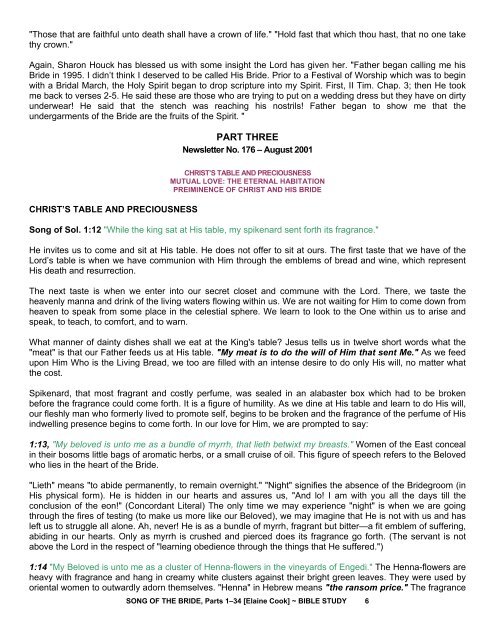
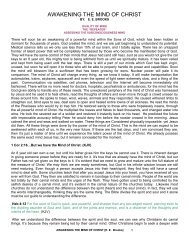
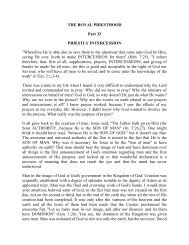
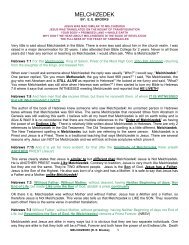
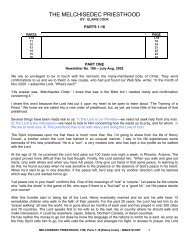
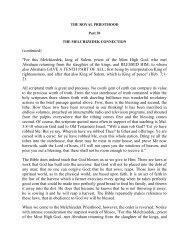
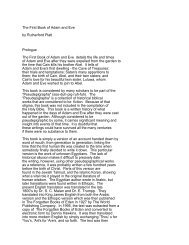
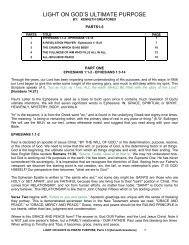
![WOOD AND STONE â THE STORY OF KING CAIN [EE Brooks]](https://img.yumpu.com/31019666/1/190x245/wood-and-stone-a-the-story-of-king-cain-ee-brooks.jpg?quality=85)
